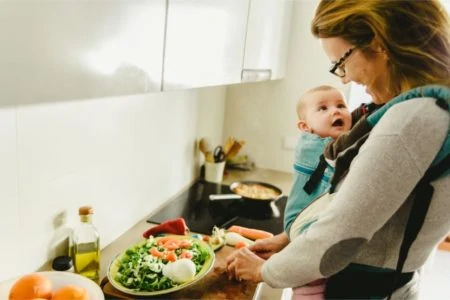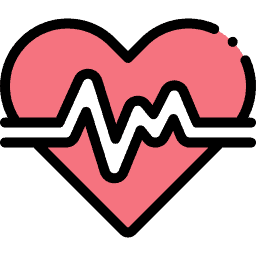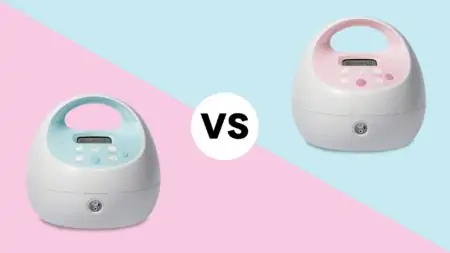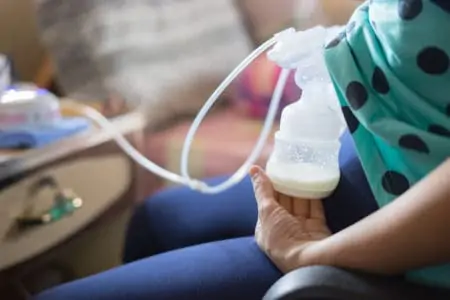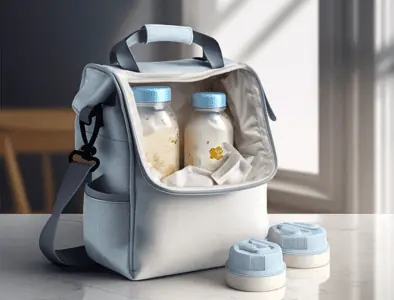Let’s be honest: nursing hunger is a different beast entirely. You might feel like you could eat the entire contents of your fridge and still have room for dessert. But are you actually eating enough to fuel that liquid gold? Or maybe you are worried you’re overdoing it?
Counting calories isn’t strictly necessary, but your body is working overtime right now. It needs fuel to survive, thrive, and keep up with your baby’s demands.
We’re breaking down the science of calorie consumption for breastfeeding parents. We will cover exactly how much you need, where to get the best nutrients, and how to stay satisfied without crashing later.
Key Takeaways
- Boost your intake: Breastfeeding moms typically need an additional 450 to 500 kcals daily, totaling around 2,500 kcals depending on activity levels.
- Watch the sugar: “Empty calories” from soda and processed baked goods spike your blood sugar without providing the nutrients you or your baby need.
- Focus on density: Prioritize complex carbohydrates, iron-rich proteins, healthy fats, and constant hydration to maintain energy and milk supply.
- Patience with weight loss: Breastfeeding burns calories, but your body may hold onto fat stores initially. Focus on nourishment over restriction.
How Many Calories Do I Need When Breastfeeding?
The Dietary Guidelines for Americans suggest that your daily calorie target depends on a few personal variables (1). It is not a one-size-fits-all number. Factors include:
- Current age.
- Height and weight.
- Daily physical activity level.
- Whether you are exclusively breastfeeding or combo-feeding.
For women aged 19 to 50 who want to maintain their caloric balance, the general guidelines break down as follows. Remember, as we age, our metabolism naturally slows down, slightly reducing these needs:
- Sedentary lifestyle: 1,800 to 2,000 kcals.
- Moderately active: 2,000 to 2,200 kcals.
- Active lifestyle: 2,200 to 2,400 kcals.
Breastfeeding Requires Extra Fuel
If you want to get specific, the USDA DRI calculator is a fantastic tool. It calculates your daily nutrient recommendations based on the Dietary Reference Intakes.
Apps can also help you visualize what you are eating. Tools like MyFitnessPal or Lose It! are great for ensuring you are eating *enough*, not just for restricting intake.
The “Empty Calories” Trap
Not all calories are created equal. “Empty calories” refers to foods that pack a heavy caloric punch but offer very little in return regarding vitamins, fiber, minerals, or phytochemicals (3). They give you a quick burst of energy followed by a crash.
Watch out for these common culprits:
- High-sugar items: Syrups, pastries, cookies, and frozen desserts like ice cream.
- Processed breakfast foods: Sugary cereals and coated granola bars.
- Fast food staples: French fries, greasy pizza, and onion rings.
- Heavy condiments: Full-fat mayonnaise or sugary salad dressings.
Don’t forget what’s in your cup. Sodas, energy drinks, sweetened fruit juices, and alcohol are prime sources of empty calories. They fill you up temporarily but don’t fuel your milk production.
Many restaurants now include calorie labeling on their menus. This transparency helps you make informed choices when ordering out (4).
Power Foods for Breastfeeding Moms
You want foods that work as hard as you do. Nutrient-dense options contain healthy fats, vitamins, minerals, and fiber. They keep your energy levels stable and pass vital nutrients to your baby (5).
Fill your plate with these essentials:
1. Complex Carbohydrates
Think whole-wheat bread, brown rice, beans, oatmeal, fruits, and vegetables. Unlike refined carbs that spike and crash your blood sugar, complex carbs release energy slowly. This provides the sustained stamina you need for those marathon cluster-feeding sessions.
Plus, complex carbohydrates often contain Vitamin B12. This passes through breast milk and supports the development of your baby’s nervous system.
2. Iron-Rich Foods
Postpartum fatigue is real, and low iron makes it worse. Stock up on lean beef, poultry, white beans, spinach, lentils, and lima beans. Maintaining healthy iron levels helps fight off exhaustion so you can focus on your little one.
3. Proteins
Protein is the building block for you and your baby. Load up on white meat, eggs, fish, beans, and nuts.
If you are vegetarian or vegan, swap the meat for tofu, legumes, quinoa, and seeds. A quick snack of Greek yogurt or a cheese stick also packs a protein punch, plus calcium for your bones and your baby’s.
4. Healthy Fats
Fat is essential for your baby’s brain development. Avocados, olive oil, chia seeds, and fatty fish like salmon are incredible sources of Omega-3s. These healthy fats help enrich your milk and keep you feeling fuller for longer.
5. Hydration
Hydration is non-negotiable. While the old “12 glasses a day” rule is a decent benchmark, the best advice is to drink to thirst (6). Keep a water bottle near your nursing station.
Water is best, but milk (dairy or fortified plant-based) adds calcium and Vitamin D to your diet. If your urine is pale yellow, you are likely hydrated enough.
Will Breastfeeding Help Me Lose Weight?
This is the million-dollar question. Producing milk burns about 650 calories a day for women exclusively breastfeeding in the first six months. That is roughly the equivalent of an hour-long jog.
However, post-pregnancy weight loss isn’t guaranteed. Hormones like prolactin can sometimes cause the body to hold onto fat stores to ensure milk production. Sleep deprivation also increases cortisol, which can make weight loss harder.
Focus on nourishment first. If you eat 1,000 extra calories of junk food because nursing makes you ravenous, the math won’t work in your favor. Be patient with your body; it took nine months to grow your baby, so give yourself grace as you recover.
